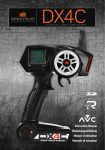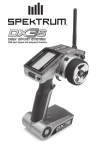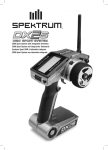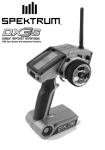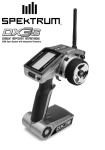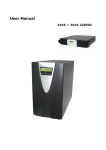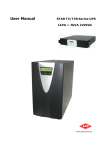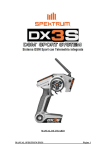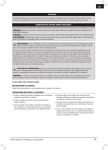Download Spektrum SPM4200 remote control
Transcript
DX4C 4-Channel 2.4GHz DSMR™ System Instruction Manual Bedienungsanleitung Manuel d’utilisation Manuale di istruzioni EN NOTICE All instructions, warranties and other collateral documents are subject to change at the sole discretion of Horizon Hobby, LLC. For up-to-date product literature, visit horizonhobby.com and click on the support tab for this Product. MEANING OF SPECIAL LANGUAGE The following terms are used throughout the product literature to indicate various levels of potential harm when operating this product: NOTICE: Procedures, which if not properly followed, create a possibility of physical property damage AND little or no possibility of injury. CAUTION: Procedures, which if not properly followed, create the probability of physical property damage AND a possibility of serious injury. WARNING: Procedures, which if not properly followed, create the probability of property damage, collateral damage and serious injury OR create a high probability of superficial injury. WARNING: Read the ENTIRE instruction manual to become familiar with the features of the product before operating. Failure to operate the product correctly can result in damage to the product, personal property and cause serious injury. This is a sophisticated hobby product. It must be operated with caution and common sense and requires some basic mechanical ability. Failure to operate this product in a safe and responsible manner could result in injury or damage to the product or other property. This product is not intended for use by children without direct adult supervision. Do not attempt disassembly, use with incompatible components or augment product in any way without the approval of Horizon Hobby, LLC. This manual contains instructions for safety, operation and maintenance. It is essential to read and follow all the instructions and warnings in the manual, prior to assembly, setup or use, in order to operate correctly and avoid damage or serious injury. WARNING AGAINST COUNTERFEIT PRODUCTS Always purchase from a Horizon Hobby, LLC authorized dealer to ensure authentic high-quality Spektrum product. Horizon Hobby, LLC disclaims all support and warranty with regards, but not limited to, compatibility and performance of counterfeit products or products claiming compatibility with DSM or Spektrum. NOTICE: This product is only intended for use with unmanned, hobby-grade, remote-controlled vehicles and aircraft. Horizon Hobby disclaims all liability outside of the intended purpose and will not provide warranty service related thereto. Age Recommendation: Not for Children under 14 years. This is not a toy. WARRANTY REGISTRATION Visit community.spektrumrc.com today to register your product. SAFETY PRECAUTIONS • Always ensure all batteries have been properly charged prior to using the model. • Always check all servos and their connections prior to each run. • Never operate your model near spectators, parking areas or any other area that could result in injury to people or damage of property. • Never point the transmitter antenna directly toward the model. The radiation pattern from the tip of the antenna is inherently low. • If at any time during the operation of your model you observe any erratic or abnormal operation, immediately stop operation of your model until the cause of the problem has been ascertained and corrected. • Never operate your model during adverse weather conditions. Poor visibility can cause disorientation and loss of control of your model. SPEKTRUM DX4C • TRANSMITTER INSTRUCTION MANUAL EN TABLE OF CONTENTS Identifying Controls and Switches ..................................4 Installing Batteries........................................................4 the Rubber Grip ...........................................................5 Raceware Firmware Updates ........................................5 ModelMatch ................................................................5 Warning screens ..........................................................6 Receiver Compatibility ..................................................6 AVC – Active Vehicle Control ........................................6 Aux channels ...............................................................6 Electric Vehicle Installation ............................................7 Nitro Vehicle Installation................................................7 SRS410 Failsafe ..........................................................7 SRS4210 Failsafe ........................................................7 Binding the Transmitter and Receiver ............................8 Main Screen ................................................................8 Using the Rolling Selector .............................................9 Individual Direction Adjustments....................................9 List .............................................................................9 Press ..........................................................................9 Roll .............................................................................9 Hold ............................................................................9 Model........................................................................10 Reverse .....................................................................10 Travel ........................................................................10 Expo .........................................................................11 Sub-Trim ...................................................................12 Timer .......................................................................12 Name ........................................................................12 Switch .......................................................................13 System .....................................................................14 Copy .........................................................................14 Reset ........................................................................15 Active Vehicle Control (AVC) ........................................15 Mixing .......................................................................16 Steer Mix...................................................................16 About ........................................................................17 Troubleshooting Guide ................................................17 1-Year Limited warranty .............................................18 WARRANTY SERVICES ................................................18 FCC Information .........................................................19 Antenna Separation Distance ......................................19 IC Information ............................................................20 Compliance Information for the European Union ...........20 Declaration of Conformity ...........................................20 CONTENTS SYSTEM FEATURES The DX4C radio system is supplied with the following: • One-touch easy-to-use programming • DX4C Transmitter • Programmable Up or Down timers • SRS4210 Receiver (SPMSRS4210) • 56 (high) x 64 (wide) high-resolution dot-matrix screen • Bind Plug (SPM6802) • 20-model memory • Grip Set (SPM9006) • Travel adjust • Exponential • Steering mix • Programmable mix • AVC – Active Vehicle Control SPEKTRUM DX4C • TRANSMITTER INSTRUCTION MANUAL 3 EN IDENTIFYING CONTROLS AND SWITCHES Function Function A Button A I Rubber Grip B Button B J Power Switch C Button C K Power LED D Button D L Battery Cover E Button E M Throttle Trigger F LCD Screen N Steering Wheel G Roller Selector O Antenna H Memory Card Port (under rubber grip) A B C D O F G E Press the power switch J to power ON the transmitter. The Power LED K will come on, a Spektrum logo screen will show, then the Main Screen will show on the LCD screen F . N M H I K J L INSTALLING BATTERIES CAUTION: NEVER remove the transmitter batteries while the model is powered on. Loss of model control, damage or injury may occur. SPEKTRUM DX4C • TRANSMITTER INSTRUCTION MANUAL EN THE RUBBER GRIP This transmitter includes 3 sizes of grips. The medium-size grip is installed at the factory. To change the rubber grip 1. Lift the edge of the grip and pull the grip away from the handle. 2. Align the tabs on the new grip with the slots in the handle. 3. Press the grip against the handle. RACEWARE FIRMWARE UPDATES The DX4C features an SD card reader, enabling you to update the transmitter when RaceWare™ firmware updates are available. Register your transmitter at www.SpektrumRC.com to receive the latest information regarding RaceWare firmware updates. To install RaceWare firmware updates on your DX4C transmitter: 1. Remove the grip from the back of the transmitter handle. 2. Download the latest RaceWare firmware from www.SpektrumRC.com to an SD card. The transmitter serial number can be found by going to the About screen. 3. Install the SD card in the card reader slot on the DX4C transmitter. 4. Power on the transmitter. A Spektrum logo and an installation bar will appear. Installation is complete when the Main screen appears. 5. Power off the transmitter. 6. Remove the SD card from the card slot on the transmitter. 7. Re-install the rubber grip on the transmitter handle. MODELMATCH The Spektrum DX4C transmitter features ModelMatch™ technology, preventing you from operating a vehicle when the wrong model memory is active in the transmitter. If you select the wrong model memory, the receiver will not respond to the transmitter. SPEKTRUM DX4C • TRANSMITTER INSTRUCTION MANUAL 5 EN WARNING SCREENS Low Battery Alarm An alarm will sound and a warning screen will show when the transmitter’s battery power goes below a set limit. This alarm reminds a user to bring the model under full control, power off the transmitter and replace batteries. Press the Roller to stop the alarm and go to the Main Screen. Set the low battery limit using the System Screen. Inactivity Alarm An alarm will sound and a warning screen will show when the transmitter has been left on (approximately 10 minutes) without control movement. Moving any control will stop the alarm. This alarm reminds users to power off the transmitter and save battery power. RECEIVER COMPATIBILITY • The DX4C transmitter is compatible with Spektrum™ DSMR™, DSM®, DSM2®, and Marine surface receivers. • The Spektrum SRS4210 DSMR Surface receiver is compatible with all Spektrum DSMR transmitters and is also backwards compatible with DSM2 transmitters. The SRS4210 receiver is NOT compatible with DSM transmitters. • The SR410 DSMR receiver is ONLY compatible with DSMR transmitters. Antenna Antenna Bind/Battery Port Disable Data Aux 2 Port Aux 1 Port Throttle Port Steering Port Aux 2 Port Aux 1 Port Throttle Port Steering Port Bind/ Battery Port AVC – ACTIVE VEHICLE CONTROL AUX CHANNELS The Spektrum SRS4210 receiver features Active Vehicle Control™ (AVC™) technology that responds similar to traction control in full-scale vehicles. In addition to traction control, AVC technology also increases steering stability during high speed driving or while driving over rough terrain. As you increase the AVC sensitivity, the system increases steering stability and traction control, similar to reducing the amount of steering rate in a computer transmitter. Reducing the sensitivity value increases the amount of steering control from the transmitter. The SRS4210 receiver also enables you to quickly turn AVC on or off if you participate in organized racing. The Aux channels can operate as additional servo channels, or as a power supply for a personal transponder. If AVC technology is active, only two channels, Steering and Throttle, are operational. The Aux channels can be used to power a personal transponder or lights. If AVC is disabled (see DISABLING THE STABILITY ASSIST FUNCTION to disable AVC), the Aux channels will operate as servo channels. NOTICE: You must use digital servos with the SRS4210 receiver. Using analog servos will reduce the performance of the system and may cause analog servos to overheat. SPEKTRUM DX4C • TRANSMITTER INSTRUCTION MANUAL EN SRS4210 Receiver Connection and Installation Install the Receiver in your vehicle using the included doublesided foam servo tape. Foam servo tape will hold the receiver in place and help isolate it from vibrations. You must install the receiver in the vehicle before binding the transmitter and receiver. The receiver can be mounted flat with the label up or on its side. When you bind the receiver, the AVC system automatically detects the orientation of the receiver. The receiver must be mounted completely flat when in the label-up orientation or completely perpendicular when mounted on its side. If the receiver is angled even slightly, AVC may not function properly. If the orientation of the receiver is changed after binding, you must then rebind for AVC to function properly. SR410 Receiver Installation Install the receiver in your vehicle using double-sided foam servo tape. Foam servo tape holds the receiver in place and protects the receiver from vibration. Position the antenna vertically and away from the vehicle in an antenna tube. The SR410 and SRS4210 have a coax-style antenna. The last 31mm of the antenna is the portion that receives the signal from the transmitter. ELECTRIC VEHICLE INSTALLATION IMPORTANT: Do not use hook & loop material to install the SRS4210 receiver. Using hook & loop material will affect the performance of the AVC system. Mount the antenna up and away from the vehicle in an antenna tube. The higher up the antenna is, the better signal it will receive. CAUTION: Do not cut or bend the antenna. Doing so could damage the antenna, resulting in the loss of vehicle control. Mount the antenna up and away from the vehicle in an antenna tube. The higher up the antenna is, the better signal it will receive. NITRO VEHICLE INSTALLATION To Motor Battery Battery Receiver Electronic Speed Control Throttle Servo Steering Servo Steering Servo Receiver SRS410 FAILSAFE SRS4210 FAILSAFE The throttle failsafe position is set during binding. In the unlikely event that the radio link is lost during use, the receiver will drive the the throttle servo to its pre-programmed failsafe position (normally full brakes) and all other channels will have no servo output. If the receiver is turned on prior to turning on the transmitter, the receiver will enter the failsafe mode, driving the the throttle servo to its preset failsafe position. When the transmitter is turned on, normal control is resumed. In the unlikely event that the radio link is lost during use, the receiver will drive the throttle channel to the neutral position. If the receiver is powered on prior to turning on the transmitter, the receiver will enter the failsafe mode, driving the throttle channel to the neutral position. When the transmitter is turned on, normal control is resumed. IMPORTANT: Failsafe activates only in the event that signal is lost from the transmitter. Failsafe will NOT activate in the event that receiver battery power decreases below the recommended minimums or power to the receiver is lost. SPEKTRUM DX4C • TRANSMITTER INSTRUCTION MANUAL IMPORTANT: Failsafe activates only in the event that signal is lost from the transmitter. Failsafe will NOT activate in the event that receiver battery power decreases below the recommended minimums or power to the receiver is lost. 7 EN BINDING THE TRANSMITTER AND RECEIVER In order to operate, the receiver must be bound to the transmitter. Binding is the process of programming the receiver to recognize the GUID (Globally Unique Identifier) code of a single specific transmitter. When a receiver is bound to a transmitter/ model memory, the receiver will only respond to that specific transmitter/model memory. Binding and Calibrating the Receiver (AVC Receivers Only) You must calibrate the receiver each time it is placed in bind mode. IMPORTANT: The following sequence of steps must be followed in order for AVC to function properly. 1. Insert the Bind Plug in the BIND port on the receiver. 2. Power on the receiver. The orange LED flashes, indicating the receiver is in bind mode. 3. Center the ST TRIM and TH TRIM on the transmitter. 4. Put your transmitter in bind mode. 5. The bind process is complete when the orange LED on the receiver is solid. 6. Pull the transmitter trigger to Full Throttle. 7. Push the transmitter trigger to Full Brake, then return the trigger to center. 8. Turn the transmitter steering wheel to Full Right. 9. Turn the transmitter steering wheel to Full Left, then return the steering wheel to center. The orange LED flashes once. 10. Remove the bind plug once the calibration and binding process is complete. 11. Power off the transmitter. IMPORTANT: You must rebind the transmitter and receiver if you: • • • Change the servo reverse after binding Change the travel after binding Want to use the receiver with a different model memory If you change the servo reversing or travel adjust after binding, AVC will not work properly. Disabling the Stability Assist Function If you participate in organized racing, you may be required to turn AVC technology off. To turn off AVC technology, insert a second Bind Plug in the Disable port before binding. IMPORTANT: You must calibrate the receiver each time it is placed in bind mode. To activate AVC, see the steps in BINDING AND CALIBRATING THE RECEIVER. Binding (All other receivers) 1. With the receiver off, insert the bind plug into the BIND port in the receiver. 2. Power the receiver through any port. If an ESC is being used, power on the ESC with the ESC lead plugged in the throttle channel port. The orange LED will flash continuously, indicating that the receiver is in bind mode. 3. With the throttle channel in the desired preset failsafe position (generally full brake and neutral steering), initiate the bind process with your Spektrum transmitter. This stores the failsafe position. Continue to hold the failsafe position until the binding process is complete. 4. The LED on the receiver should now be solid, indicating a successful bind has taken place. 5. When the bind process is complete, remove the bind plug from the receiver and store it in a convenient place. Failure to remove the bind plug will result in the receiver going back into bind mode. The only time it is necessary to rebind is if different failsafe positions are desired e.g., servo travel has been reversed after the initial bind, or if you want to use the receiver with a different model memory. MAIN SCREEN The Main Screen displays information about the selected model such as trim positions, timer, the model selected, battery voltage, etc. This screen shows the Timer only when activated. An alarm will sound when the transmitter’s battery voltage goes below the value set in the System Screen. An alarm will sound when the timer gets to the limit (DOWN) set in the Timer Screen. While in any screen, press and hold the Rolling Selector for more than 3 seconds to return to the Main Screen. Throttle (TH) and Steering (ST) trim positions show as blocks in rectangles. A B C D E F Active Model Memory Model Name Transmitter battery voltage St (Steering) Trim Position Th (Throttle) Trim Position Timer A B E F C D SPEKTRUM DX4C • TRANSMITTER INSTRUCTION MANUAL EN USING THE ROLLING SELECTOR PRESS ROLL HOLD Press the Selector to enter a highlighted function. Roll the Selector to highlight a function or change settings and values when selected. Press and hold the Selector for more than 3 seconds in any screen to return the display to the List Screen or the Main Screen. To Enter, Choose or Exit a selection. To move between options or change values in an option. To program, always start with a press on the Selector, then roll, then press, then roll, and so on. Hold for 3 seconds and release to return to the Main or Telemetry screen. INDIVIDUAL DIRECTION ADJUSTMENTS “Sticky GUI” In some instances, you may find it necessary to independently adjust the control directions; for example, if you want more travel for left steering than right steering, perform the following steps: In the Travel, Expo, Mixing and Steer Mixing Screens, sticky GUI (pronounced gooey) makes value adjustment easier. When you move the channel control (the steering wheel or throttle trigger) to the desired position and release, the value on the screen for that side remains highlighted. 1. Scroll to the value you wish to change and press the Rolling Selector. 2. When both directions are selected, move the control (steering or throttle) toward the control direction you wish to change. The selection box moves to the desired direction. You do not need to hold the control in the desired direction. 3. To change the opposite direction, simply move the control in that direction. Move the control the opposite direction to highlight the other value on the screen. You do not have to hold the control in the desired position for the value to be changed. Highlight both values on the screen again by pressing the Rolling Selector twice with the control centered. 4. Press the Rolling Selector to save the selection. LIST The List Screen shows other screens to set programming in the transmitter. A A dark box around with a clear symbol or text shows highlighted selection. Available screens are Select, Reverse, Travel, Expo, Bind, Sub-Trim, Timer, Name, Switch, System, Copy, Reset, AVC, Mixing and Steer Mix. B Active Screen name shows at the top of the screen. C Choosing this arrow will return to the previous screen. D A small bar shows relative position of highlighted screen name in the List. A B C D SPEKTRUM DX4C • TRANSMITTER INSTRUCTION MANUAL 9 EN MODEL Select function opens a model memory for control of a model or adjustment of saved settings. If you haven’t programmed a model memory, all settings will be at factory default. CAUTION: Do NOT change the model in Model Select while operating a model. Change of the model interrupts transmitter signal to the receiver and may cause a crash. B A A Model name (programmable in Name Screen). B Model memory number (20 available). REVERSE The Reverse function (also known as servo reversing) establishes the servo’s direction relative to the channel’s input (e.g., a right steering input should result in a right steering angle at the model). Reverse is available on all channels and is normally the first function that is checked and adjusted during programming. Movement of a control or switch is NOT changed. Instead, a channel’s response to transmitter input is reversed. A B C Tip: Your model manual may refer to this as changing transmitter control directions in the Control Test/Reverse Controls section. A Box shows around selected text. B Channels which can be reversed. C Dark box shows direction servo is set (Normal is shown): NOR=normal or REV=reverse. TRAVEL The Travel function supports precise endpoint adjustments in each direction for all channels A B C D E Channel L (left)* R (right)* Box shows around selected text. Adjustable value (from 0 to 150%) A D B E C *Reference chart for options available for each channel: Channel Top Bottom Steering L (left) R (right) Throttle B (brake) F (forward) Aux 1 H (high) L (low) Aux 2 H (high) L (low) NOTICE: Always check the control directions at the extents of travel to be sure the linkages do not bind. Travel values that are too high will cause binding, which may result in damage to the vehicle. SPEKTRUM DX4C • TRANSMITTER INSTRUCTION MANUAL EN EXPO A The Exponential (Expo) function affects the response rate of the steering, throttle and/or brake. A positive Steering Expo value, for example, decreases steering sensitivity around neutral to make it easier to drive at high speeds in a straight line while still allowing for maximum turning radius. While sensitivity with positive Expo is decreased around neutral, it increases the sensitivity near the end of travel. D B A B C D E *Reference chart for options available for each channel: Channel Top Bottom Steering L (left) R (right) Throttle B (brake) F (forward) Binding the Transmitter and Receiver In order to operate, the receiver must be bound to the transmitter. Binding is the process of programming the receiver to recognize the GUID (Globally Unique Identifier) code of a single specific transmitter. When a receiver is bound to a transmitter/ model memory, the receiver will only respond to that specific transmitter/model memory. Binding and Calibrating the Receiver (AVC Receivers Only) You must calibrate the receiver each time it is placed in bind mode. IMPORTANT: The following sequence of steps must be followed in order for AVC to function properly. 1. Insert the Bind Plug in the BIND port on the receiver. 2. Power on the receiver. The orange LED flashes, indicating the receiver is in bind mode. 3. Center the ST TRIM and TH TRIM on the transmitter. 4. Put your transmitter in bind mode. 5. The bind process is complete when the orange LED on the receiver is solid. 6. Pull the transmitter trigger to Full Throttle. 7. Push the transmitter trigger to Full Brake, then return the trigger to center. 8. Turn the transmitter steering wheel to Full Right. 9. Turn the transmitter steering wheel to Full Left, then return the steering wheel to center. The orange LED flashes once. 10. Remove the bind plug once the calibration and binding process is complete. 11. Power off the transmitter. SPEKTRUM DX4C • TRANSMITTER INSTRUCTION MANUAL E C Channel L (left)* R (right)* Box shows around selected text Adjustable value (from -100% to +100% (0 is factory default or inhibit)) IMPORTANT: You must rebind the transmitter and receiver if you: • Change the servo reverse after binding • Change the travel after binding • Want to use the receiver with a different model memory If you change the servo reversing or travel adjust after binding, AVC will not work properly. Disabling the Stability Assist Function If you participate in organized racing, you may be required to turn AVC technology off. To turn off AVC technology, insert a second Bind Plug in the Disable port before binding. IMPORTANT: You must calibrate the receiver each time it is placed in bind mode. To activate AVC, see the steps in BINDING AND CALIBRATING THE RECEIVER. A B C D A B C D E E Select Bind when a receiver is prepared for binding. Active model number Active model name Mode Speed 11 EN SUB-TRIM The Sub-Trim function allows electronic adjustment or centering of each servo to get the servo arm exactly perpendicular to the servo, or in the exact optimum desired position. Minor sub-trim values can be used to correct this offset inaccuracy. Sub-trim is adjustable for all channels. A B C CAUTION: Use only small sub-trim values so a servo’s maximum travel is NOT overdriven. *Reference chart for options available for each channel: Channel Description Steering L (left) R (right) Throttle B (brake) F (forward) Aux 1 H (high) L (low) Aux 2 H (high) L (low) A Channel B Box shows around selected text C Value for servo alignment (varies among channels) * Range is 0 to 100 in both directions TIMER The Timer function supports Up and Down timing. When started by an assigned button, the time shows on the Main Screen. Tip: Refer to Switch Screen instructions for assigning a button to the Timer (Button E on the grip handle is recommended). Down timer – is the default timer type. The timer can be set in 10-second increments to count down from 10 minutes. Normally, this timer is programmed for the length of a race. The timer’s default setting is 5 minutes runtime for electric (battery capacity) and gas-powered (fuel-tank capacity). Start the timer by pressing the assigned timer button. When the time expires, an alarm will sound (when Buzzer is not set to OFF) and then begin to count up. To pause or continue the Down timer, press the timer button once. To reset the Down timer to its pre-programmed value, press and hold the timer button for more than 3 seconds. Up timer - is started by pressing the timer button and counts up from 00:00 seconds, functioning as a stopwatch. The Up timer is useful for timing a fuel run to determine fuel mileage/pit stop strategy. The Up timer can also be used for electric vehicles to time the run time of a battery pack for determining gear ratio and setup. To pause or restart the Up timer, press the timer button. To reset the Up timer to 00:00 press and hold the timer button for more than 3 seconds. B A C A Value for timer B Box shows around selected text C Options: Inhibit, Down and Up NAME Assign a name for a model memory in this screen. 10 characters can be used to name a model. This name shows on the Main Screen when an model memory is active. Tip: You can only change a model name when the model memory is active. A Active model memory B Model Name (10 character spaces available) C Marker showing selected character A B C SPEKTRUM DX4C • TRANSMITTER INSTRUCTION MANUAL EN SWITCH The Switch Screen lets you assign 5 available switches to these special functions: ST trim Assigns a switch to adjust center or neutral so steering tracks straight. TH trim Assigns the throttle idle adjustment to switch. Adjust throttle neutral (idle) position for drag braking or rolling idle for some models. Decreasing idle can enable a drag brake. Increasing idle can keep a model rolling until the brake is used. Brake Assigns brake trim to switch. Full brake is the default. Braking power can be decreased using this trim on some models. Aux 1 Lin Assigns channel 3 (Auxiliary) to switch as linear output (see servo illustration). This allows for proportional adjustment of servo position. This is particularly useful for fuel mixture control on gas engines. Aux 1 2P Assigns channel 3 (Auxiliary) to switch as 2-position output (see servo illustration). This is useful for forward and reverse transmissions and some 2-speed transmissions. Aux 1 3P Assigns channel 3 (Auxiliary 1) to switch as 3-position output (see servo illustration). This is useful for forward, neutral and reverse transmissions and some dig transmissions. Aux 2 Lin Assigns channel 4 (Auxiliary 1) to switch as linear output (see servo illustration). This allows for proportional adjustment of servo position. This is particularly useful for fuel mixture control on gas engines. Aux 2 2P Assigns channel 4 (Auxiliary 2) to switch as 2-position output (see servo illustration). This is useful for forward and reverse transmissions and some 2-speed transmissions. Aux 2 3P Assigns channel 4 (Auxiliary 2) to switch as 3-position output (see servo illustration). This is useful for forward, neutral and reverse transmissions and some dig transmissions. Tip: Reverse and Travel Screens adjust the endpoints and direction of the Auxiliary channel. ROSS ST D/R Remote start assigned to a switch. Assigns Steering rate to a switch so a driver can make on-the-fly steering travel adjustments. Steering rate limits the amount of travel of the steering servo. 1 1 Assigns the ST Gain to a switch, enabling you to adjust the sensitivity without using the AVC menu. TH GAIN Assigns TH Gain to a switch, enabling you to adjust the sensitivity without using the AVC menu. ST/TH GAIN Assigns the ST GAIN and TH GAIN to the same switch, enabling you to adjust both gain values simultaneously. Priority Assigns the AVC Priority to a switch, enabling you to adjust the priority without using the AVC menu. Inhibit No function assigned to switch. * LOSI ROSS (Remote Onboard Starting System) A B C A Box shows around selected text B Switch letter (see transmitter illustration) C Function assigned to the switch Assignment of switches in other screens changes what is shown in this screen. The factory default switch assignments are shown here. Reset of the transmitter returns switch assignments to these functions. 100 Lin (Linear) 1 2 ST GAIN 3 3P (3 position) 2 2P (2 position) SPEKTRUM DX4C • TRANSMITTER INSTRUCTION MANUAL 13 EN SYSTEM The System function lets you adjust transmitter interaction. Selections affect all saved model memories. A Username You can program a username with up to 10 characters. This name shows on the Main Screen. Username defaults to Spektrum. G About.... This shows the release level of the transmitter’s software. Refer to Memory Card instructions for updating transmitter software. H A small bar shows relative position of highlighted screen name in the list. In the System screen highlight the Username and press the roller to access the function. Use the roller to select the position, then press the roller to access a character. B RS Port This sets the port (Bind or Aux (Auxiliary) on the receiver for ROSS (Remote Onboard Starting System) connection. C Alert You can set an alarm to sound when the battery voltage gets to the limit set with the Alert. The range which can be set is from 0.0V to 6.2V. Battery voltage shows on the Main Screen. CAUTION: Do not operate a model when the battery voltage is below 4V. D Contrast The contrast function provides adjustment to the brightness ratio of the lightest to the darkest part of the screen. You can set the contrast to a value from 0 to 30 (0 is lightest and 30 is darkest). A B C D E F H G E Buzzer You can adjust sounds in loudness among Off, Low and High. Buzzer adjustment does not change sound level for Inactivity or Low Battery warnings. F Lang (Language) You can select English, German (Deu.), French (Francais) or Italian (Italiano) as the language showing on transmitter screens. COPY The Copy function shares active model memory settings with a selected model memory space. This is useful for saving setups for one model to adjust programming for track conditions or model setups. A Active or source model memory number B Name of active or source model memory C Box shows selected text D Name of destination model memory E Destination model memory Name F Choosing No returns to the List Screen G Choosing Yes saves active model settings to the selected model memory IMPORTANT: Model information saved in a memory is erased and overwritten by active model settings using this Copy function. A B C D E F G SPEKTRUM DX4C • TRANSMITTER INSTRUCTION MANUAL EN RESET The Model Reset function restores factory default settings for the active model memory. A Choosing No returns to the List Screen. B Choosing Yes affirms erasing saved settings for the active model memory and return of factory defaults. C A box shows around selected text. A C B IMPORTANT: Model information saved in a memory is erased when that model memory is copied over or reset to factory default settings. ACTIVE VEHICLE CONTROL (AVC) Options: A ST Gain B TH Gain C Priority A 1. Select AVC from the LIST menu. 2. Change the State field to ACT . 3. Adjust the ST Gain and/or TH Gain Sensitivity The default value is 0% (ST Gain and TH Gain OFF). As the value increases, the AVC steering stability and throttle management increases. Adjust the ST Gain until you reach the ideal amount of steering control. If the front wheels begin to shake, the ST Gain value is too high. Reduce the ST Gain value until the front wheels stop shaking. You can assign ST Gain and TH Gain to the same switch, enabling you to adjust both values at the same time. 4. Switch: Assigning ST Gain and TH Gain to a switch enables you to adjust the sensitivity without using the AVC menu. ST GAIN and TH GAIN can be assigned to the same switch to adjust both simultaneously. 5. Adjust the Steering Priority The Priority default value is 0%, meaning AVC is active when the steering is close to center. As you turn the steering wheel away from center (neutral), the transmitter controls have priority over the AVC system. Increasing the Priority value decreases how active AVC is as the steering wheel is turned left and right. For example, if you increase Priority to 80%, you reduce the AVC steering control by 80% at full left or full right steering. Increasing the Steering Priority enables you to make tighter turns. SPEKTRUM DX4C • TRANSMITTER INSTRUCTION MANUAL B C 15 EN MIXING The Mixing function lets Steering, Throttle or Aux Channel follow control input made to the Steering, Throttle or Aux channel. When a mix is enabled and the assigned input control is moved, the master (primary) channel sends output at the same time the slave (secondary) channel sends output. Output is sent to the model in the direction and to the position assigned in the Mixing Screen. Tip: You can only select the Aux channel as Slave in this screen when Steer Mix is inhibited. Mixing default setting is inhibit (Inh). When anything other than Inh is selected, you can make additional adjustments on the Mixing Screen. A A box shows around selected text. B The primary or master channel can be either ST (Steering), TH (Throttle) or AUX (Auxiliary). C The secondary or Slave channel can be set on ST, TH or Aux (Channel 3 Auxiliary). D This rate value sets the amount of slave servo travel and can be set from -125% to +125%. A negative value results in the slave channel moving in a direction opposite the direction of the primary channel. E Inh must be changed to enter other mixing values. A D E NOTICE: Before driving a model, always do a check of the model’s response to mix settings. Raise the vehicle off the ground so it does not move during testing. IMPORTANT: A negative value results in the secondary channel moving in a direction opposite the direction of the primary channel. A STEER MIX Steer Mix function supports mixing Steering to Auxiliary channel so the Auxiliary input follows input to Steering. Steer mix is usually used to manage how much rear steering follows front steering inputs. Typically, this mixing function is used with 2 steering servos on trucks (front and rear servos). F/R (front/rear) type supports 2 mix rates so crab steering and four-wheel steering can be used momentarily with a switch. Dual type supports full-time mixing without a switch. Assigning a switch in this screen changes the assignment of that switch in the Switch Screen. The default switch for F/R is E. When Steer Mix is not inhibited, the Auxiliary channel cannot be selected as Slave in the Mixing screen. When Steer Mix is assigned to a switch, moving the switch accesses the alternate set of rate values. Adjust positive (+) and negative (-) values for conventional or crab steering. NOTICE: Before driving a model, always do a check of the model’s response to steer mix settings. Raise the vehicle off the ground so it does not move during testing. C B A B C D E F G H I B F C G D H I E A box shows around selected text. Dual is full-time front/rear steer mixing at the programmed rates. When Trim is Act (activated), the ST trim is applied to both the ST and AUX channels. When Trim is Inh (inhibit), the ST trim is only applied the ST channel. Act is the default. This rate value for right steering sets the amount of Auxiliary servo travel and can be set from -125% to +125%. A negative value results in the Auxiliary channel moving in a direction opposite the direction of the Steering channel. This rate value for left steering sets the amount of Auxiliary servo travel and can be set from -125% to +125%. A negative value results in the Auxiliary channel moving in a direction opposite the direction of the Steering channel. F/R enables switch assignment for the programmed steering mix rates 1 and 2. The assigned switch (A, B, C, D or E) lets a driver enable front/rear steering mix rate 1 or 2. Position 1 for the assigned switch. Position 2 for the assigned switch. SPEKTRUM DX4C • TRANSMITTER INSTRUCTION MANUAL EN ABOUT This screen displays the transmitter serial number (which is required when downloading firmware updates) and the release level of the transmitter’s software. Refer to Memory Card instructions for updating transmitter RaceWare firmware. TROUBLESHOOTING GUIDE PROBLEM The system will not connect The receiver goes into failsafe mode a short distance away from the transmitter POSSIBLE CAUSE SOLUTION Transmitter and receiver too near each other Move transmitter 8 to 12 feet (2.4 to 3.6m) from receiver Transmitter and receiver too near large metal Move away from large metal objects (vehicles, etc.) objects (vehicles, etc.) Selected model is not bound in transmitter Make sure correct model memory is selected and that transmitter is bound to the model Transmitter accidentally put in bind mode so receiver is no longer bound Rebind transmitter and receiver Check the receiver antenna to be sure it is not cut or damaged Replace or contact Horizon product Support Make sure receiver antenna is in an antenna tube and is above vehicle Receiver quits responding during operation Low battery voltage Completely recharge battery Loose or damaged wires or connectors between battery and receiver Do a check of the wires and connection between battery and receiver. Repair or replace wires and/or connectors Receiver loses its bind Transmitter accidentally put in bind mode, ending bind to receiver Bind transmitter to receiver Receiver taking longer than usual to link with transmitter Transmitter and receiver are operating on Marine model Marine receivers can take longer to link with transmitter The front wheels oscillate The steering gain is set too high Turn down the steering gain The front wheels turn The steering channel was reversed after the wrong way when calibration the car slides/rotates Rebind and calibrate The throttle does not reduce when the car slides/rotates Rebind and calibrate The throttle channel was reversed after calibration SPEKTRUM DX4C • TRANSMITTER INSTRUCTION MANUAL 17 EN 1-YEAR LIMITED WARRANTY What this Warranty Covers Horizon Hobby, LLC, (Horizon) warrants to the original purchaser that the product purchased (the “product”) will be free from defects in materials and workmanship for a period of 1 year from the date of purchase. What is Not Covered This warranty is not transferable and does not cover (i) cosmetic damage, (ii) damage due to acts of God, accident, misuse, abuse, negligence, commercial use, or due to improper use, installation, operation or maintenance, (iii) modification of or to any part of the product, (iv) attempted service by anyone other than a Horizon Hobby authorized service center, (v) product not purchased from an authorized Horizon dealer, or (vi) product not compliant with applicable technical regulations. OTHER THAN THE EXPRESS WARRANTY ABOVE, HORIZON MAKES NO OTHER WARRANTY OR REPRESENTATION, AND HEREBY DISCLAIMS ANY AND ALL IMPLIED WARRANTIES, INCLUDING, WITHOUT LIMITATION, THE IMPLIED WARRANTIES OF NON-INFRINGEMENT, MERCHANTABILITY AND FITNESS FOR A PARTICULAR PURPOSE. THE PURCHASER ACKNOWLEDGES THAT THEY ALONE HAVE DETERMINED THAT THE PRODUCT WILL SUITABLY MEET THE REQUIREMENTS OF THE PURCHASER’S INTENDED USE. Purchaser’s Remedy Horizon’s sole obligation and purchaser’s sole and exclusive remedy shall be that Horizon will, at its option, either (i) service, or (ii) replace, any product determined by Horizon to be defective. Horizon reserves the right to inspect any and all PROduct(s) involved in a warranty claim. Service or replacement decisions are at the sole discretion of Horizon. Proof of purchase is required for all warranty claims. SERVICE OR REPLACEMENT AS PROVIDED UNDER THIS WARRANTY IS THE PURCHASER’S SOLE AND EXCLUSIVE REMEDY. Limitation of Liability HORIZON SHALL NOT BE LIABLE FOR SPECIAL, INDIRECT, INCIDENTAL OR CONSEQUENTIAL DAMAGES, LOSS OF PROFITS OR PRODUCTION OR COMMERCIAL LOSS IN ANY WAY, REGARDLESS OF WHETHER SUCH CLAIM IS BASED IN CONTRACT, WARRANTY, TORT, NEGLIGENCE, STRICT LIABILITY OR ANY OTHER THEORY OF LIABILITY, EVEN IF HORIZON HAS BEEN ADVISED OF THE POSSIBILITY OF SUCH DAMAGES. Further, in no event shall the liability of Horizon exceed the individual price of the product on which liability is asserted. As Horizon has no control over use, setup, final assembly, modification or misuse, no liability shall be assumed nor accepted for any resulting damage or injury. By the act of use, setup or assembly, the user accepts all resulting liability. If you as the purchaser or user are not prepared to accept the liability associated with the use of the product, purchaser is advised to return the product immediately in new and unused condition to the place of purchase. Law These terms are governed by Illinois law (without regard to conflict of law principals). This warranty gives you specific legal rights, and you may also have other rights which vary from state to state. Horizon reserves the right to change or modify this warranty at any time without notice. WARRANTY SERVICES Questions, Assistance, and Services Your local hobby store and/or place of purchase cannot provide warranty support or service. Once assembly, setup or use of the product has been started, you must contact your local distributor or Horizon directly. This will enable Horizon to better answer your questions and service you in the event that you may need any assistance. For questions or assistance, please visit our website at www.horizonhobby.com, submit a Product Support Inquiry, or call the toll free telephone number referenced in the Warranty and Service Contact Information section to speak with a Product Support representative. Inspection or Services If this product needs to be inspected or serviced and is compliant in the country you live and use the product in, please use the Horizon Online Service Request submission process found on our website or call Horizon to obtain a Return Merchandise Authorization (RMA) number. Pack the product securely using a shipping carton. Please note that original boxes may be included, but are not designed to withstand the rigors of shipping without additional protection. Ship via a carrier that provides tracking and insurance for lost or damaged parcels, as Horizon is not responsible for merchandise until it arrives and is accepted at our facility. An Online Service Request is available at http://www.horizonhobby.com/content/_service-center_renderservice-center. If you do not have internet access, please contact Horizon Product Support to obtain a RMA number along with instructions for submitting your product for service. When calling Horizon, you will be asked to provide your complete name, street address, email address and phone number where you can be reached during business hours. When sending product into Horizon, please include your RMA number, a list of the included items, and a brief summary of the problem. A copy of your original sales receipt must be included for warranty consideration. Be sure your name, address, and RMA number are clearly written on the outside of the shipping carton. NOTICE: Do not ship Li-Po batteries to Horizon. If you have any issue with a Li-Po battery, please contact the appropriate Horizon Product Support office. Warranty Requirements For Warranty consideration, you must include your original sales receipt verifying the Proof-of-purchase date. Provided warranty conditions have been met, your product will be serviced or replaced free of charge. Service or replacement decisions are at the sole discretion of Horizon. SPEKTRUM DX4C • TRANSMITTER INSTRUCTION MANUAL EN Non-Warranty Service Should your service not be covered by warranty, service will be completed and payment will be required without notification or estimate of the expense unless the expense exceeds 50% of the retail purchase cost. By submitting the item for service you are agreeing to payment of the service without notification. Service estimates are available upon request. You must include this request with your item submitted for service. Non-warranty service estimates will be billed a minimum of 1/2 hour of labor. In addition you will be billed for return freight. Horizon accepts money orders and cashier’s checks, as well as Visa, MasterCard, American Express, and Discover cards. By submitting any item to Horizon for service, you are agreeing to Horizon’s Terms and Conditions found on our website http://www.horizonhobby.com/content/_service-center_ render-service-center. ATTENTION: Horizon service is limited to Product compliant in the country of use and ownership. If received, a non-compliant product will not be serviced. Further, the sender will be responsible for arranging return shipment of the un-serviced product, through a carrier of the sender’s choice and at the sender’s expense. Horizon will hold non-compliant product for a period of 60 days from notification, after which it will be discarded. WARRANTY AND SERVICE CONTACT INFORMATION Country of Purchase United States of America Horizon Hobby Contact Information Horizon Service Center (Repairs and Repair Requests) servicecenter.horizonhobby.com/ RequestForm/ www.quickbase.com/db/ bghj7ey8c?a= GenNewRecord Horizon Product Support (Product Technical Assistance) Address 4105 Fieldstone Rd Champaign, Illinois, 61822 USA 888-959-2306 Sales United Kingdom Service/Parts/Sales: Horizon Hobby Limited Germany Horizon Technischer Service Sales: Horizon Hobby GmbH France Service/Parts/Sales: Horizon Hobby SAS China Service/Parts/Sales: Horizon Hobby – China [email protected] 888-959-2306 [email protected] +44 (0) 1279 641 097 [email protected] +49 (0) 4121 2655 100 [email protected] +33 (0) 1 60 18 34 90 [email protected] +86 (021) 5180 9868 Units 1–4 , Ployters Rd, Staple Tye Harlow, Essex, CM18 7NS, United Kingdom Christian-Junge-Straße 1 25337 Elmshorn, Germany 11 Rue Georges Charpak 77127 Lieusaint, France Room 506, No. 97 Changshou Rd. Shanghai, China 200060 FCC INFORMATION This device complies with part 15 of the FCC rules. Operation is subject to the following two conditions: (1) This device may not cause harmful interference, and (2) this device must accept any interference received, including interference that may cause undesired operation. CAUTION: Changes or modifications not expressly approved by the party responsible for compliance could void the user’s authority to operate the equipment. ANTENNA SEPARATION DISTANCE When operating your Spektrum transmitter, please be sure to maintain a separation distance of at least 5 cm between your body (excluding fingers, hands, wrists, ankles and feet) and the antenna to meet RF exposure safety requirements as determined by FCC regulations. The illustrations below show the approximate 5 cm RF exposure area and typical hand placement when operating your Spektrum transmitter. This product contains a radio transmitter with wireless technology which has been tested and found to be compliant with the applicable regulations governing a radio transmitter in the 2.400GHz to 2.4835GHz frequency range. SPEKTRUM DX4C • TRANSMITTER INSTRUCTION MANUAL 19 EN IC INFORMATION This device complies with Industry Canada licence-exempt RSS standard(s). Operation is subject to the following two conditions: (1) this device may not cause interference, and (2) this device must accept any interference, including interference that may cause undesired operation of the device. COMPLIANCE INFORMATION FOR THE EUROPEAN UNION AT EE IE PL IS BE BG ES FI IT LT PT RO LI NO CZ CY DE DK FR GR HR HU LU LV MT NL SE SI SK UK CH INSTRUCTIONS FOR DISPOSAL OF WEEE BY USERS IN THE EUROPEAN UNION DECLARATION OF CONFORMITY (in accordance with ISO/IEC 17050-1) No. HH2014041301 Product(s): DX4C DSMR 4-Channel Surface Radio w/SRS4210 DX4C DSMR 4-Channel Surface Radio with SR410 Item Number(s): SPM4210, SPM4200 Equipment class: 2 The object of declaration described above is in conformity with the requirements of the specifications listed below, following the provisions of the European R&TTE Directive 1999/5/EC: EN 300-328 V1.7.1: 2006 EN 301 489-1 V1.9.2: 2012 This product must not be disposed of with other waste. Instead, it is the user’s responsibility to dispose of their waste equipment by handing it over to a designated collections point for the recycling of waste electrical and electronic equipment. The separate collection and recycling of your waste equipment at the time of disposal will help to conserve natural resources and ensure that it is recycled in a manner that protects human health and the environment. For more information about where you can drop off your waste equipment for recycling, please contact your local city office, your household waste disposal service or where you purchased the product. EN301 489-17 V2.1.1: 2009 EN60950-1:2006+A11:2009+A1:2010+A12: 2011 Signed for and on behalf of: Horizon Hobby, LLC Champaign, IL USA Apr 13, 2014 Robert Peak Chief Financial Officer Horizon Hobby, LLC SPEKTRUM DX4C • TRANSMITTER INSTRUCTION MANUAL ©2014 Horizon Hobby, LLC DSM, DSM2, DSMR, RaceWare, ModelMatch,Active Vehicle Control, AVC and the Horizon Hobby logo are trademarks or registered trademarks of Horizon Hobby, LLC. The Spektrum trademark is used with permission of Bachmann Industries, Inc. The SD Logo is a trademark of SD-3C, LLC Created 4/14 43708 SPM4210





















